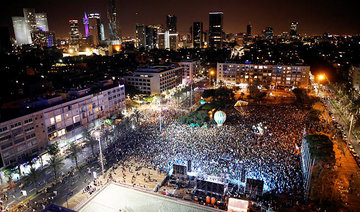AMMAN: Palestinian President Mahmoud Abbas has triggered a frantic search for a new strategy toward ending Israeli occupation and establishing a Palestinian state.
During the Palestine Central Council meeting earlier this month, Abbas angrily declared that US-brokered negotiations were over after President Donald Trump recognized Jerusalem as Israel’s capital.
Abbas’ two-hour speech in front of the 80-member council was followed by a boycott of the visiting US Vice President Mike Pence.
The Palestinian leadership has triggered the pursuit of a more even-handed mechanism to handle negotiations with Israel.
Hani Al-Masri, a Ramallah-based Palestinian analyst, described Abbas’ speech as having delved “deep into history, passed quickly over the present, and largely — almost totally — ignored the future.”
But Abbas did give some hints about possible options ahead.
Palestinians have long claimed the talks were biased in favor of Israel and Abbas called for any further discussion to be brokered by an international committee.
He also said they would pursue Israel at the International Criminal Court for war crimes, encourage popular resistance and continue to work with Israeli peace activists.
International sponsors
Abbas dispatched emissaries to Russia and China soon after Trump broke with decades of US policy with his Jerusalem declaration last month.
But the focus of Palestinian diplomatic strategy has been on Europe where the hope is that Brussels can provide balance to the pro-Israel US role.
Abbas visited Belgium last week and urged European countries to respond by recognizing the state of Palestine with its capital in East Jerusalem. But the plea was met with a muted response.
Slovenia’s foreign minister said he hoped his country would later this year become the 10th European nation to recognize Palestine. Sweden is the only country to have recognized Palestine while being part of the EU. Countries like the Czech Republic and Hungary did so before joining the bloc. Ireland, Portugal, Luxemburg and Belgium are debating whether to follow suit.
While the EU assured Abbas of its commitment to a two-state solution with Jerusalem as a shared capital, there was little support during his visit for his call to immediately recognize the Palestinian state, Reuters reported.
The EU is the biggest donor of aid to Palestinians but it is also the largest trade partner with Israel.
In a meeting in Washington on Wednesday, the head of Palestine’s mission to the US, Husam Zomlot told a delegation of European diplomats that the issue is no longer one of the negotiations but of implementation.
“The time is ripe for the activation of the international community led by Europe to take a lead role in a peace implementation process that is based on international law,” he said.
While efforts in Brussels and other international moves will continue, it is not expected that this alone will lead to significant progress in the near future.
Non-violent resistance
For many Palestinians, the only realistic and possible alternative to US-led peace talks is what Abbas referred to as “peaceful popular resistance.”
The Palestinian president praised the tactics deployed during the first intifada, which started in 1987, and made it clear that he abhors violence.
Mubarak Awad the founder of the International Center for Nonviolence told Arab News that peaceful resistance must be a dedicated strategy, not a short-term tactic.
“We are requesting many groups, organization, colleges, universities, and churches to boycott, divest and sanction Israel yet we eat Israeli products.”
He suggested that Palestine begin forming local communities to take care of people in preparation for an economic struggle against Israel that will inevitably lead to a cut in the Palestinian budget.
“Local bodies need to organize, prepare and help their members to be prepared for the cost and sacrifice that will come with the struggle for freedom and independence. They need to work towards bringing unity and self-reliance.”
At the present time, Awad and others are aware that neither Abbas nor most of his Fatah movement are capable of leading a physically demanding national non-violent campaign.
The majority of Fatah activists are deeply embroiled in the Palestinian government and most of its leaders are over 65.
Awad also suggested that Palestinians should consider using a different currency than the Israeli Shekel, such as the Jordanian dinar, Egyptian pound, or create a Palestinian currency.
There is also the challenge of political apathy among Palestinian parties and factions, especially in Gaza where living conditions are the worst and people feel they have been pawns in the hands of local and regional powers and ideologies.
Palestinians search for alternatives to US-led peace process
Palestinians search for alternatives to US-led peace process















